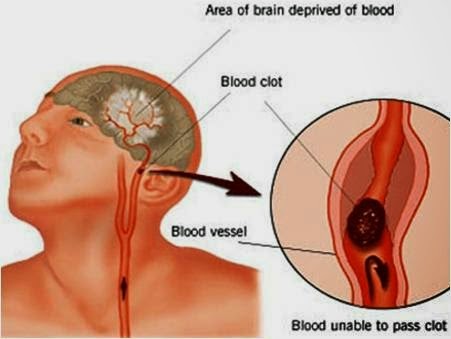Vascular Dementia - Early Warning Signs, Causes, Diagnosis and Treatment
Vascular Dementia
Dementia describe the loss of mental abilities associated with the gradual death of brain cells.
Vascular dementia is caused by reduced blood flow to the brain due to a problem with the blood vessels that supply. Part of the brain become damaged and eventually die from lack of oxygen and nutrients.
However, unlike other forms of dementia, many cases of vascular dementia can be prevented.
Early Warning Signs
Many cases of vascular dementia began with the early warning signs that can be treated. This initial phase is known as 'vascular cognitive impairment'. If the disease is caught at this stage, brain damage can be stopped and vascular dementia can be prevented.
People with vascular cognitive impairment may begin to show symptoms of dementia, such as slowness of thinking, difficulty with planning, memory loss, problems with language, and mood or behavior changes. These symptoms indicate that some brain damage has occurred and must be treated immediately.
If you are worried because you think you have started to show some signs of vascular dementia, or you think someone you know have it, find a doctor.
Signs of Vascular Dementia
After vascular cognitive impairment developing into vascular dementia, the disease can only be slowed, not stopped. At this stage dementia symptoms will usually be much clearer, and can be exacerbated by depression.
Exact symptoms will depend on the area of the brain that has been affected.
Learn more about symptoms of vascular dementia and early warning signs.
What Causes of Vascular Dementia ?
The most common cause of vascular dementia is narrowing and blockage of small blood vessels deep within the brain. The medical name for this is the subcortical vascular dementia, or 'small vessel disease'.
Most cases of this disease result from inheriting certain genes from your parents, so often seen running in the family. Persistent high blood pressure is thought to play a role and can worsen the disease.
Due to the effect of high blood pressure, vascular dementia may partly be prevented. Regulate high blood pressure, lose excess weight and quitting smoking can reduce the risk of disease, or at least slow its development.
How is it Diagnosed?
To diagnose vascular dementia or a test for the early warning signs, the doctor will usually be:
How the disease is treated, and what are the prospects?
If the vascular cognitive impairment caught before it develops into dementia, lifestyle changes and control of blood pressure can prevent more damage to the brain and, importantly, can prevent vascular dementia.
Recommended lifestyle changes include losing excess weight, quitting smoking and eating healthy.
After vascular cognitive impairment developing into vascular dementia, the disease can only be slowed, not stopped. Medications can help control some of the symptoms.
Support rehabilitation such as physiotherapy, occupational therapy and speech therapy aims to help people regain lost functions, and activities of dementia such as 'memory cafe' and some psychological therapies can help control symptoms.
Symptoms usually continued to deteriorate over the years. Brain damage that causes vascular dementia are permanent and will significantly shorten the life. Most people will die either from complications of dementia, such as pneumonia, or from a stroke.
Dementia affects the entire life of those affected, as well as their families. If you have been diagnosed with dementia, or you are caring for someone with this condition, advice and support is available to help you.
Dementia describe the loss of mental abilities associated with the gradual death of brain cells.
Vascular dementia is caused by reduced blood flow to the brain due to a problem with the blood vessels that supply. Part of the brain become damaged and eventually die from lack of oxygen and nutrients.
However, unlike other forms of dementia, many cases of vascular dementia can be prevented.
Early Warning Signs
Many cases of vascular dementia began with the early warning signs that can be treated. This initial phase is known as 'vascular cognitive impairment'. If the disease is caught at this stage, brain damage can be stopped and vascular dementia can be prevented.
People with vascular cognitive impairment may begin to show symptoms of dementia, such as slowness of thinking, difficulty with planning, memory loss, problems with language, and mood or behavior changes. These symptoms indicate that some brain damage has occurred and must be treated immediately.
If you are worried because you think you have started to show some signs of vascular dementia, or you think someone you know have it, find a doctor.
Signs of Vascular Dementia
After vascular cognitive impairment developing into vascular dementia, the disease can only be slowed, not stopped. At this stage dementia symptoms will usually be much clearer, and can be exacerbated by depression.
Exact symptoms will depend on the area of the brain that has been affected.
Learn more about symptoms of vascular dementia and early warning signs.
What Causes of Vascular Dementia ?
The most common cause of vascular dementia is narrowing and blockage of small blood vessels deep within the brain. The medical name for this is the subcortical vascular dementia, or 'small vessel disease'.
Most cases of this disease result from inheriting certain genes from your parents, so often seen running in the family. Persistent high blood pressure is thought to play a role and can worsen the disease.
Due to the effect of high blood pressure, vascular dementia may partly be prevented. Regulate high blood pressure, lose excess weight and quitting smoking can reduce the risk of disease, or at least slow its development.
How is it Diagnosed?
To diagnose vascular dementia or a test for the early warning signs, the doctor will usually be:
- Assess your symptoms.
- Taking a complete history of your medical.
- Assess your mental abilities.
- Your physical check.
- Reviewing medications you use.
- Ordering a variety of tests, including blood tests, to rule out other possible causes of your symptoms.
- Direct you to a brain scan, if necessary.
How the disease is treated, and what are the prospects?
If the vascular cognitive impairment caught before it develops into dementia, lifestyle changes and control of blood pressure can prevent more damage to the brain and, importantly, can prevent vascular dementia.
Recommended lifestyle changes include losing excess weight, quitting smoking and eating healthy.
After vascular cognitive impairment developing into vascular dementia, the disease can only be slowed, not stopped. Medications can help control some of the symptoms.
Support rehabilitation such as physiotherapy, occupational therapy and speech therapy aims to help people regain lost functions, and activities of dementia such as 'memory cafe' and some psychological therapies can help control symptoms.
Symptoms usually continued to deteriorate over the years. Brain damage that causes vascular dementia are permanent and will significantly shorten the life. Most people will die either from complications of dementia, such as pneumonia, or from a stroke.
Dementia affects the entire life of those affected, as well as their families. If you have been diagnosed with dementia, or you are caring for someone with this condition, advice and support is available to help you.


Komentar
Posting Komentar